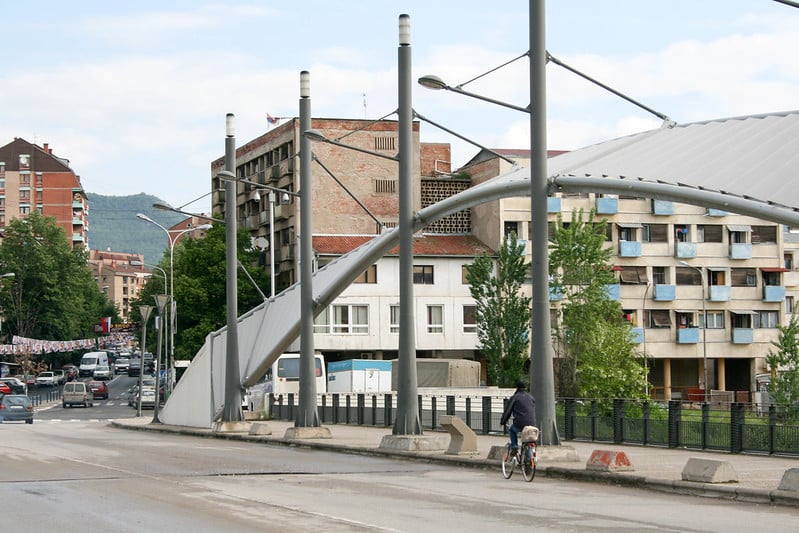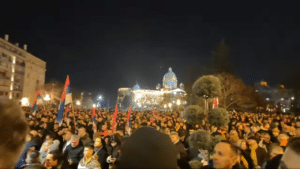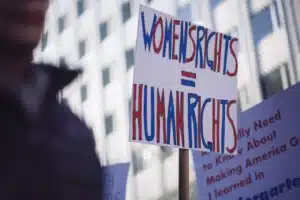The bridge that divides Mitrovica into a northern (Serb majority) and southern (Kosovar majority) part (Flickr)
After an agreement was reached between Kosovo and Serbia over the infamous dispute over license plates, the region is still far from calm. Local elections have been postponed. Serbian security personnel may be redeployed in Kosovo. Escalation still lurks, even after EU and US interference.
Local elections postponed during civil unrest in northern Kosovo
Kosovo authorities have postponed local elections that were due to take place on 18 December 2022 in four municipalities with a predominantly Serb community until 23 April 2023. It is a frantic attempt by Kosovo to defuse tensions with ethnic Serbs in the north of the country. In Zubin Potok, Zvecan, Leposavic, and North Mitrovica – a town ethnically divided between Serbs and Kosovars – residents will not go to the polls until next year. Doubts were already growing for some time about the viability to hold extraordinary mayoral elections in northern Kosovo as the situation was unstable following a series of incidents and disputes.
During the dispute, ethnic Serbs in public positions handed in their mass resignations in November 2022. The representation of the ethnic Serb party Srpska Lista had to be replaced in its entirety to avoid a constitutional problem. Kosovan Prime Minister Kurti told Brussels well after the intervention that ethnic Serbs who had resigned had to reapply to return to their positions. For the upcoming local elections, Srpska Lista members had not declared themselves eligible. Because of the short run-up period to the local elections, the EU had also already announced that it could not send an election mission to Kosovo. International civil society had already indicated that the conditions for holding elections were not right because of the disproportionate political representation of ethnicities.
Meanwhile, unrest continues in the North of Kosovo. Kosovo Serbs, who are the majority in this part of the country, have erected barricades in protest against the arrest of a former police officer suspected of attacking local polling stations in North Mitrovica. In addition, local media in Kosovo report that primary and secondary schools in the north remain closed. According to Petar Petkovic, the Head of Serbia’s Office for Kosovo, there are numerous reasons for ethnic Serbs to take to the streets in Kosovo: “ [There are] dozens and dozens of reasons [for protests] in recent months and years that Belgrade and Serbs from the north of Kosovo and Metohija have been warning about. The Serbs on the barricades are sending their cry to the international community, which cannot hear them, about what is happening in Kosovo and Metohija.” The EU, UK, and US have asked for the removal of the barricades through statements by their respective embassies.
Derailing Kosovo-Serbia relations on the brink of entering a “new” chapter
Postponing the local elections is simultaneously an attempt not to derail tensions between Kosovo and neighbouring Serbia further. Relations between Kosovo and Serbia have recently been severely damaged by a high-profile dispute over number plates, which was only resolved after EU and US intervention. However, this did not lead to the desired improvement in overall relations between the two countries. In this, Kurti in particular took a tough stance towards Serbia, initially refusing to reverse the implementation of measures.
Meanwhile, Serbian president Vučić announced that his government will submit a formal request to the commander of the NATO-led peacekeeping mission in Kosovo to send 1,000 Serbian troops to the country. A day before Vučić’s announcement, the Serbian prime minister had cited how Belgrade says the lives of the Serbian minority in Kosovo are in danger. According to Belgrade, there is no illusion that the request will be granted. Serbian officials cite a UN resolution (1244) that would allow the return of 1,000 Serbian troops to Kosovo. Kurti has responded that such Serbian action is seen as an aggressive act and is indicative of the Serbian habit of destabilising the region.
Deteriorating relationships
The long-term marginalisation of Kosovars in Serbia is being reproduced by Pristina on the ethnic Serb minority in Kosovo. Kurti’s attitude in the matter of the license plates was perceived by Brussels as unconstructive and not very solution-oriented. Vučić and Kurti increasingly clash through the media, and the tone of words is becoming increasingly provocative. The EU keeps insisting on the normalisation of relations between Belgrade and Pristina, but the opposite seems to be happening. As such, sending Serbian troops to Kosovo is also not a “new” chapter, but rather a visit to the past.
Normalising relations is crucial for stability in the region, minimising Russia’s sphere of influence (especially in Serbia) and admitting both countries to the EU. With relations increasingly strained and tensions running high, the European community needs to form a strong bloc committed to stability. For that, however, it depends on cooperation with both Kosovo and Serbia and a willingness to actually compromise. Currently, relations seem to further deteriorate, threatening peace and stability not only in Kosovo but in the whole region.
Author: Mathieu Neelen
Sources: ABCnews, BalkanInsight1, BalkanInsight2
Photo: Flickr



